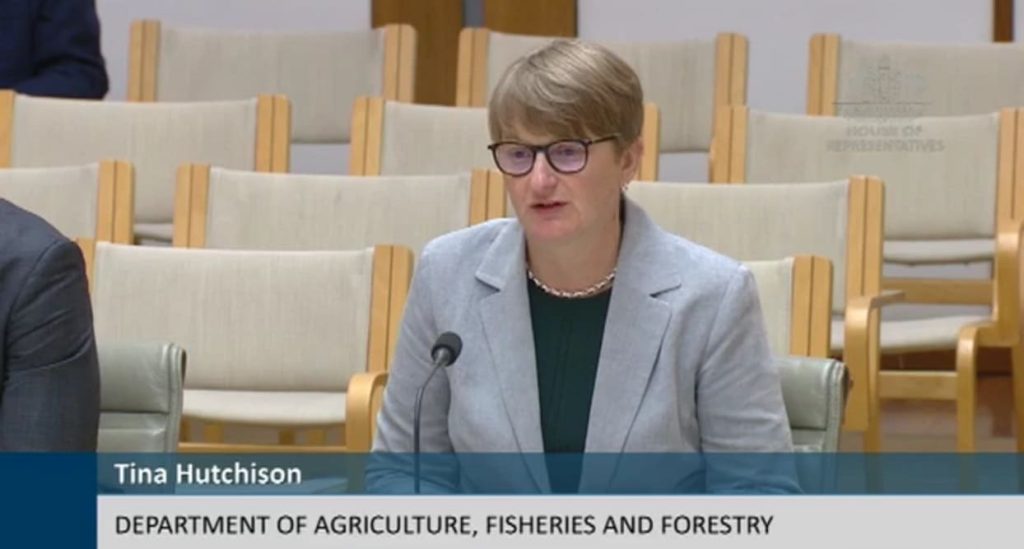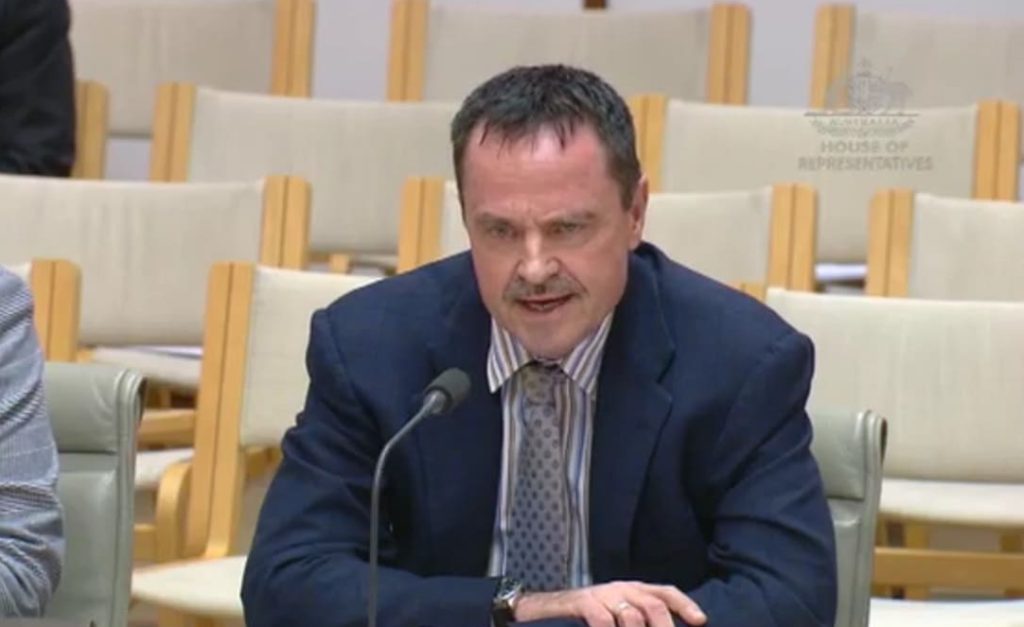
DAFF deputy secretary, agricultural trade and regulation Tina Hutchison at the inquiry.
WESTERN Australian sheep producers and livestock exporters were yesterday told government support for the proposed phaseout of live sheep exports by sea would not and was not intended to offset the impact of the Albanese Government policy.
A House of Representatives inquiry in Canberra yesterday was told programs and guidelines for the government’s $107 million transition package were not “ready”, leaving no doubts about the Albanese Government’s intended level and promptness of support for sheep producers or exporters battling impacts of the proposed trade phaseout by 1 May 2028.
The House Standing Committee on Agriculture yesterday commenced the inquiry into the Export Control Amendment (Ending Live Sheep Exports by Sea) Bill 2024, that will end the live sheep export trade by sea from 1 May 2028. Submissions to the inquiry closed on 11 June 2024. The committee will hold a second public hearing in Muresk, Western Australia on 14 June 2024.
In her opening statement, Department of Agriculture Fisheries and Forestry deputy secretary, agricultural trade and regulation Tina Hutchison said the government’s transition support package is not “based off or intended to offset the potential impact to industry.”
“It’s not an exit or compensation package nor a substitution for the value of the trade,” she said.
“The transition support has been designed to give the best effect to the panel’s recommendations agreed by the government.
“Further details on the transition support programs will be available in the third quarter of 2024,” Ms Hutchison said.
“The department will consult on the development of programs and guidelines when they are ready.”
Significantly, Ms Hutchison said “the department recognises the strong public interest in the government’s policy to phase out live sheep exports by sea and the department acknowledges how challenging this policy is for many people”, but did not recognise any current impacts on WA sheep producers battling poor seasonal conditions, low sheep and lamb prices, lack of abattoir kill space or generally low industry confidence.
Inquiry is a ruse – ALEC

ALEC chairman David Galvin addresses the inquiry.
Australian Livestock Exporters Council chairman David Galvin told the inquiry he considered the inquiry a ruse to circumvent Senate crossbench scrutiny, declaring that Minister for Agriculture Fisheries and Forestry Murray Watt had committed to a Senate inquiry with hearings in WA during a Senate Estimates hearing on 30 May, “only to backflip less than a week later and assign the task to a House of Representative committee instead.”
“It seems ironic that the Minister can insist that he is keeping his promise to ban live sheep but can’t keep his promise have a Senate inquiry,” Mr Galvin said.
“We consider this a ruse to circumvent Senate crossbench scrutiny, and to be a way for the Minister to say he has made good on his statements that he has called an inquiry and held a hearing in WA in a manner the Albanese Government has the capacity to control more tightly.
“In short, we expect this hearing to be a complete waste of everyone’s time and a recommendation to pass the legislation from this committee is a fait accompli,” Mr Galvin said.
“We will hear all the usual false arguments that this is a declining trade, that its lost community support, that the industry should feel grateful for the “generous” assistance package being offered and that everyone should feel wonderful about the rosy future that the WA sheep industry has.
“I’ve even had Labor MPs say to me that we have done the wrong thing morally by fighting the policy,” Mr Galvin said.
“Yet we are not the ones harming farmers – this government is.”
“If the ban is such a good idea, why has it been rejected by every agricultural group in Australia, more importantly rejected by the WA Government and why are WA farmers convoying the streets of Perth?” he asked.
“Are you seriously going tell us that all those people have it wrong?”
“Does this government seriously think it knows better than the hard-working professionals in the Australian ag sector?”
Mr Galvin said the agricultural industry has been mobilised in a manner that he has never seen before.
He told the inquiry: “make no mistake – this inquiry will not be the end of it.”
The only people outside of the Albanese Government that think this policy is a good idea are animal activists – is this who you take your writing instructions from?
“However, believe it or not, we still hold a glimmer of faith in the parliamentary process.”
Live sheep export phaseout process “a farce”
National Farmers Federation acting chief executive officer Charlie Thomas said the trade phaseout process has been “a farce” from the moment it was inadvertently announced via an animal activist organisation just two weeks from the Federal Election.
He said hard-working people of the industry have been treated with “absolute contempt.”
“We had to fight each step of the way for affected producers to have a fair hearing with the independent panel.
“We saw industry’s advice to that panel go unheeded in its final report,” he said.
“Then we saw the Minister go even further – rejecting key elements of the panel’s advice to adopt a plan even more radical than that of the panel.”
Mr Thomas said the inquiry is the only process to scrutinise the actual merits of the government’s policy.
“And we’ve been granted just four business days to share our thoughts, or seven days’ notice for farmers in WA to take a day out from their business to attend the Muresk hearing.
“If you wanted to design a process to dismiss and marginalise our members who are impacted by this policy, this would be it,” he said.
Mr Thomas said arguments that the trade is in decline, has lost community support and is a missed opportunity to create local jobs were untrue.
He said live sheep export volumes were up 30 percent year-on-year, pro-export petition signatories now exceeded those supporting a ban, and the independent panel itself casting doubt on job creation.
“They are each staggeringly bad reasons to impose an unprecedented legislative ban on an industry.
“In what universe would this Parliament simply start cancelling industries because they’ve contracted?,” Mr Thomas said.
“Or setting policies based purely on public popularity? That would be a grim state of affairs for lawmaking,” he said.
“If we accept those arguments are insufficient to justify this Bill, then the remaining argument is of course animal welfare.”
Mr Thomas said industry reforms – from changes to stocking densities, on-board reporting and care, the Northern Summer moratorium and much more – have ensured that in the past seven years “we’ve seen a shift to gold standard welfare outcomes on board Australian vessels.”
“The data on mortality rates prove this. An Australian-regulated live export vessel is about the safest place a sheep can be,” he said.
“The Ending Live Sheep Exports by Sea Bill will end a lot of things.
“It will end Australia’s uplift of animal welfare standards in the Middle East,” Mr Thomas said.
“It’ll end the livelihoods of farmers, shearers, truckies, agents and stock handlers in WA.
“It’ll end the strong trade and interpersonal ties Australia has developed in the Middle East as a trusted food security partner,” he said.
“In summary, it’ll end the tremendous amount of good this industry creates, both here and abroad.”
Mr Thomas said the Bill won’t end is live sheep exports by sea, “because these markets have been categoric in their discussions with the NFF and publicly that they will simply shift supply.”
“By voting for this Bill, you are actively enabling practices we banned more than a decade ago.”
Mr Thomas said the Bill also sets “a chilling precedent.”
“It tells us that where industries face issues, invest heavily in reform, and go on to meet best practice standards – they can still be shut down if a misleading activist campaign can get 40,000 signatures on a petition using imagery from 10 years ago.
“We worry, because we know the stated goal of these same organisations is an end to animal agriculture in its entirety,” he said.
“We know the moment this is done, they simply shift their focus and questionable tactics to the next industry.”
Mr Thomas said when it comes to our industry’s best interests, “we implore you to listen to the farmers, not the fanatics.”
“We are telling you loud and clear that this is a bad idea.”
Livecorp chairman Troy Setter told the inquiry the live sheep trade with Saudi Arabia has just reopened and Australia recently sent 50,000 live sheep to the market.
“The number of sheep exported in 2023 increased 30 per cent compared to 2022,” Mr Setter said.
“Saudi Arabia is really a solid case study.
“When Australia stopped supplying live sheep to Saudi Arabia 10 years, they did not increase chilled, frozen imports,” he said.
“They sourced live sheep from other countries with no animal welfare standards.”

Recently, I I was really pleased to see online how much has been done to make conditions aboard ships carrying livestock. I and millions of Aussies were unaware this is the case even though they support farmers. Perhaps a major media organisation will publicise the truth e.g. Kerry Stokes WA The Guardian and Sky News. Also, a YouTube presentation is a valuable tool if you can get a major advertiser, bearing in mind costs.
This is the beginning of the end for animal agriculture in Australia if this goes ahead.
Everything the industry is saying is absolutely right, but the Labor government’s program to close down live export can be brought to an abrupt halt by about this time next year, possibly earlier, if the people who have the power to actually control what the government does, are sufficiently informed and motivated. These people will get the opportunity to either leave the existing government in power, or alternately to change the government, and if they do the latter, live export will continue and potentially expand. However, if these people remain uniformed, and they allow the current government to stay, then live export goes.
The people with this power are the voters of Australia, and there appears to me to be no greater incentive for the entire industry, than to go knocking on their doors.
I am totally against any change to the live sheep exports. It is now a very well run & regulated trade organisation – and it should not be derailed by a group of noisy animal activists.